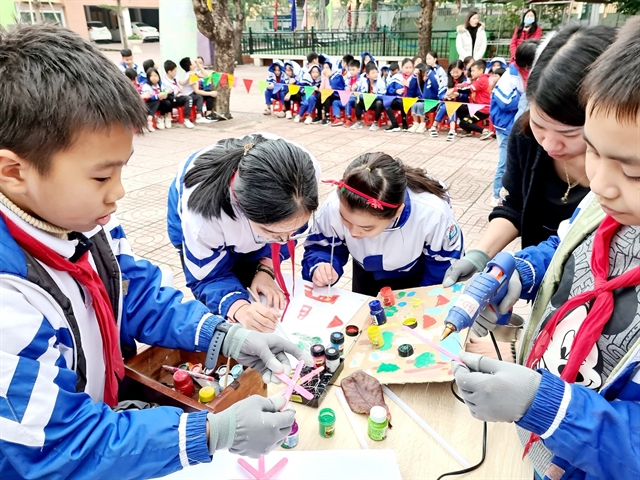 Opinion
Opinion


|
| Students participate in a STEM (Science, Technology, Engineering and Mathematics) class in an elementary school in central Nghệ An Province. — VNA/VNS Photo Bích Huệ |
According to the Ministry of Education and Training, Việt Nam needs to have 7,300 more lecturers with a doctoral degree and over 300 more with a master's degree in culture, arts and sports.
This is part of Project 89 on enhancing the capacity of lecturers and managers in tertiary education institutions to meet the requirements on fundamental and comprehensive reforms in education.
Project 89 was approved by the Prime Minister on January 18, 2019.
In 2021, as many as 165 institutions registered to send 1,277 staff to study doctorates under Project 89. Among them, 360 lecturers are sent to be trained abroad.
It is expected that by 2022, as many as 1,308 will be sent to study for a doctorate under Project 89.
In a recent interview with Giáo Dục Việt Nam (Việt Nam's Education) online magazine, Director of the Higher Education Department under the MoET Nguyễn Thu Thuỷ shared her thoughts about incentives and policies to encourage Vietnamese intellectuals to return home after finishing studies abroad to contribute to the country.
What are the policies being used to retain talent and make sure they return after finishing their studies abroad which are being funded by the Government?
Policies and incentives to attract and retain talents have been mentioned in many legal documents including the Law on Science and Technology, Law on Higher Education, decrees of the Government, and regulations of the MoET, departments, and agencies. Many localities and higher education institutions have also been implementing effective policies to attract highly qualified human resources.
Vĩnh Phúc Province has issued Resolution No 06/2021/NQ-HĐND on a number of policies to attract intellectuals and talented people to the province in 2021-2025, providing VNĐ600 million for professors, associate professors, those who hold a doctorate degree or Doctor of Medicine, and level-2 specialists; offering VNĐ400 million for those who hold a master's degree or Master of Medicine, and level-1 specialists and resident doctors. Teachers and lecturers with a doctorate degree are also supported with VNĐ600 million, those with a master's degree and bachelor's degree will be supported with VNĐ400 million and VNĐ300 million, respectively.
Lào Cai Province also issued a similar resolution, supporting those with professor titles with VNĐ1.5 billion, and those with an associate professor, doctorate degree with VNĐ1 billion and VNĐ360 million, respectively.
For higher institutions, we have HCMC University of Food Industry which offers financial support worth VNĐ75 million each for individuals with a doctorate degree, VNĐ100 million and VNĐ150 million for associate professors and professors respectively under the condition that they must work for the university for at least five years.
Although there have been many policies introduced, they are not strong enough to encourage Vietnamese scientists and intellectuals to return home and contribute more. Incentives for these individuals and their families are still limited. The research and academic environment is not favourable and not very professional, so the results are not as expected.
Currently, the MoET continues to cooperate with the Ministry of Science and Technology in studying and proposing incentives, policies, and solutions to effectively attract Vietnamese scientists and intellectuals both within Việt Nam and abroad to work in higher education institutions.
Hopefully, in the future, breakthrough policies will break down barriers and the goals of the Project 89 will be achieved. What is more important is to have a precise evaluation of the potential as well as positions and roles of Vietnamese experts and intellectuals abroad so we can have specific mechanisms and policies to encourage them to contribute to the country’s development.
Currently, there is a situation that some are sent to study abroad but when they return home they are not assigned work when they finish the training programme, so what commitment does the MoET make for those who apply for doctoral studies under Project 89?
The MoET supports training institutions and the demand for the study of learners, and at the same time requires both the institutions and learners to fulfil their commitments when sending people to study abroad and being sent for overseas studies.
This issue has been regulated in Article 10 of Circular 25 on the responsibilities of institutions that send staff to study abroad. It specifies that the institutions must “assign work for learners who have graduated from the training programme within a maximum period of 12 months, or compensate the training expenses for the State in case of refusal to accept or arrange work for learners specified in Clause 6 of this Article in accordance with current regulations”. — VNS




